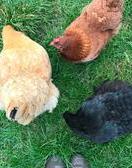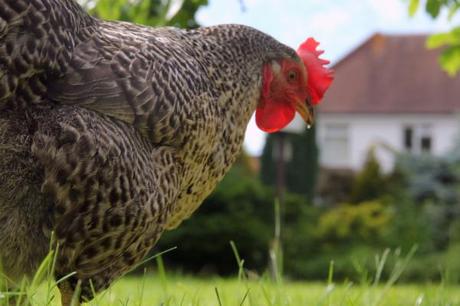
My beautiful Speckledy hen is feeling under the weather at the moment, it’s a complicated situation not made any easier with chickens naturally hiding illness. Ginny was diagnosed with egg yolk peritonitis last summer, a condition which basically means a hen begins laying internally rather than producing eggs in the usual way. Yolks and egg matter drop into the abdominal cavity and sit there, building up. Left untreated, peritonitis can be very painful due to a build-up of fluids and yolks binding to internal organs, sadly it appears to be quite common with hybrid layers but any breed can be dealt this blow. Treatment really needs to be discussed with a vet, but this usually involves draining fluid when needed with a course of antibiotic to follow.
I noticed Ginny was slowing down and not her usual active self, her trademark dark brown eggs missing from the nest box for quite some time. On closer inspection she felt large hot and swollen underneath, my suspicion of peritonitis being the culprit was confirmed after a visit to the vet. Fluid was drained from her swollen abdomen (which immediately made her feel better) and then a course of antibiotic prescribed to help combat possible infection. On her return to the vet a hormone implant called Supreloin was used to prevent her ovaries releasing eggs, we’d discussed this in depth during her previous appointment. The implant is smaller than a grain of rice and inserted just under the skin in the breast area, Ginny was fantastic about it and hardly noticed it being done. I won’t lie, hormone treatment is very expensive, but Ginny has given me a lot of joy over the years from fresh eggs to funny antics, organic fertiliser and pest control. So I bought her some time and relief.
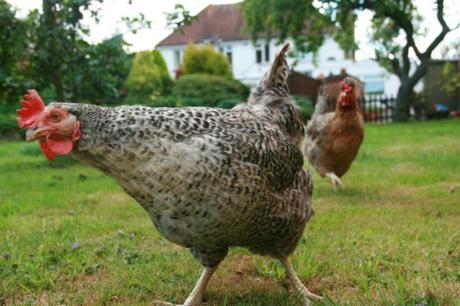
Ginny being her usual inquisitive self!!
The procedure proved to be very effective and gave her almost 6 months of running around the garden pain-free without the horrible symptoms of peritonitis and the need for draining. I should point out that the implant is not a cure for hens with peritonitis, but it does give the hen a short break from laying, managing the symptoms of the condition to give the hen concerned quality of life and perhaps a longer lifespan. However, I should also point out that the implant doesn’t work on every hen, there are no guarantees, also factors have to be taken into account for each case such as length of illness, current condition and weight. Some hens cannot be implanted full stop. I knew Ginny’s implant would need to be repeated as soon as symptoms of peritonitis returned, and they did, just before new year. Her comb began to grow and redden just as you would expect from a hen coming into lay and her abdomen began to swell and fill with fluid, a sure sign of internal laying. The day before New Years Eve I took her back to the vet to have the procedure repeated.
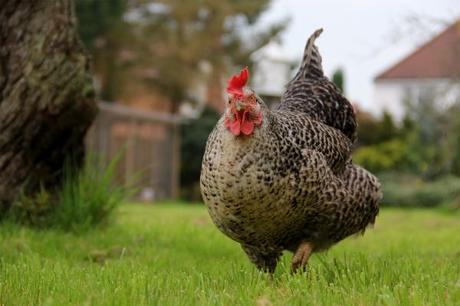
Apart from being thrown into a moult (an unfortunate symptom of the implant) which naturally made her feel a bit miserable, Ginny had been fine (well, as it could be for a hen with peritonitis) up to this point. However, she started refusing food recently and now we’re battling a second bout of sour crop. She’s losing weight and with crop problems on top it’s not looking good. I’d like to think this is just a blip with her treatment for peritonitis, but deep down I believe either her treatment for peritonitis is no longer working (whether or not this can be corrected I don’t yet know), or something else is going on. I’ve seen similar behaviour/symptoms before with hens suffering with cancerous tumours, I’m starting to think this may be the problem.
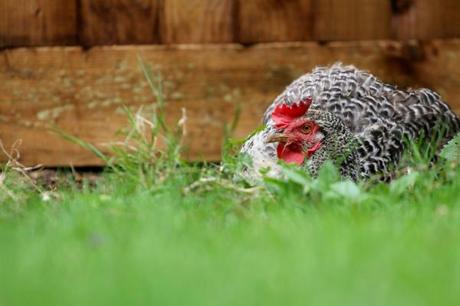
Ginny has an appointment booked for tomorrow morning to see the vet who knows her medical history. Please keep your fingers crossed that I’m wrong and that something can be done for her.
Gulp.
Filed under: Chicken Health, Chickens Tagged: chicken health, chicken problems, Egg Yolk Peritonitis, EYP, internal layer, internal laying, peritonitis, sour crop, supreloin
